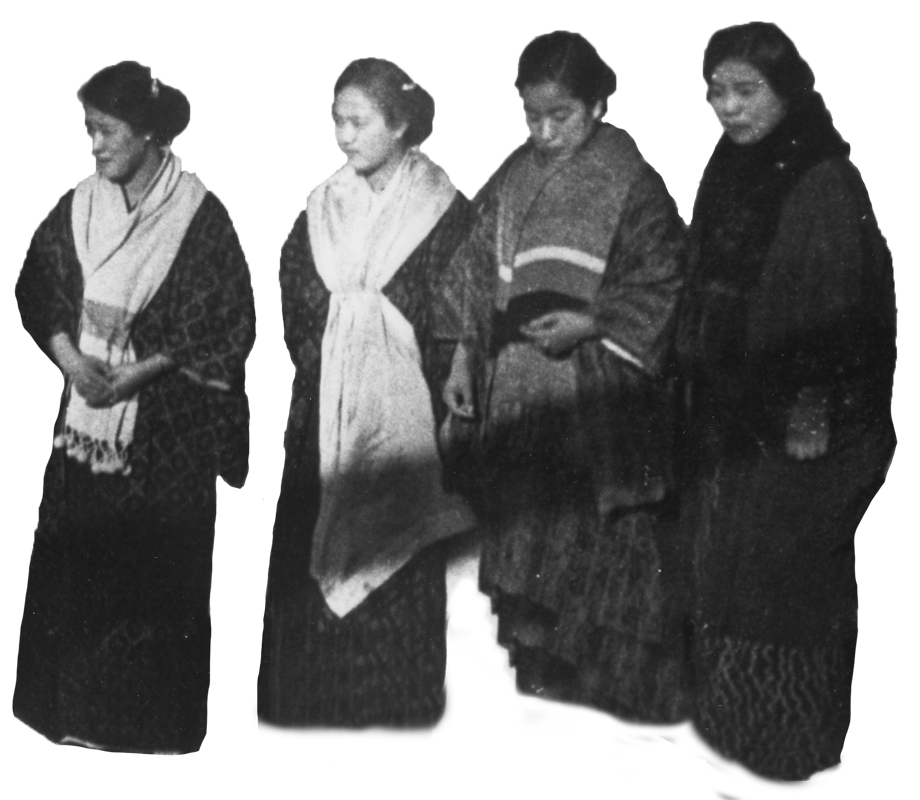THEY CALLED HER JENNIE
Jennie Kiohara, also known as Gen Fukushima, was an Issei, a young woman among the first wave of Japanese immigrants arriving to Canada.
In Revelstoke British Columbia, 1905, at the age of 24, she was brutally murdered in her home.
This site uses animation and art to shine a light on the known details of Jennie’s story.

JENNIE
What did Jennie look like?

We don’t have a photograph of Jennie but she may have looked like one of these “picture brides,” Japanese women arriving in Vancouver in the early 1900s to marry men they had never met.
ORIGIN
Why did Jennie make the long voyage across the Pacific Ocean? Was it her choice?
Jennie was born in Japan around 1881, where there was widespread poverty. In desperation, families sometimes sold their daughters into slavery and prostitution.
Perhaps Jennie was already in debt when she came, owing passage to a husband or master.
ARRIVAL
What did Jennie think when she arrived in the young railway town of Revelstoke in 1903?
Jennie lived in a brothel, a two story wooden house, at the north end of Front Street in “Lower Town”, an area populated with brothels, general stores, hotels, saloons, and several Chinese businesses.
BROTHEL LIFE
This is a Revelstoke brothel around 1900. The women are dressed in fine clothes but would have lived “segregated” lives separate from the rest of society.
Brothels were confined to Lower Town and were frequently visited by railway workers, miners and loggers.
ARRESTS
Jennie was regularly arrested for being a prostitute, and charged under Bylaw 9 Respecting Public Morals and Convenience. This police log book reveals that Jennie was booked twice in 1904. Each time, Jennie was fined $25.00 plus $4.75 in court charges, the equivalent of $900 in today’s currency.
In 1904, 62 different women were arrested under Bylaw 9, with a total of 79 bookings in this one year.
In contrast, men who frequented brothels were seldom charged, or given paltry fines of $1 to $5.
BROTHEL OWNER
The brothel where Jennie was a Keeper was owned by this man. Wah Chung owned a number of buildings and businesses in Revelstoke including the restaurant shown here on Mackenzie Avenue.
There were rumours that Wah Chung was Jennie’s pimp, lover and even uncharged murder suspect but there is no evidence to support this.
ASSAULT
On May 12, 1903 Jennie was brutally assaulted by an A. Mallet. Here you can see from the report in the police log book that the informant was S. Fukishima. Remember this name, as it will appear later in Jennie’s story.
ABUSE
The violence of this attack is graphically described in the Revelstoke Herald of May 28, 1903 and gives us a glimpse into the hardship suffered by Jennie during her short life.
MURDER
Just two years later, on April 19 1905 Jennie was violently murdered in her home. She was just 24 years old.
CULPRITS
After Jennie’s death two Japanese men were arrested in connection with her murder. The press reported that one of these men had been living with Jennie for some time and had argued with Jennie and threatened her life.
You can see here in the police log book that one of these men was Fukishima, the same man who was the informant when Jennie was assaulted in 1903; he was released after 8 days in detention.
PREJUDICE
This newspaper article gives us a glimpse into the treatment Jennie experienced in Revelstoke.
This is one example of how attitudes towards race and class of the time may have prevented anyone from being charged with Jennie’s murder.
DISCOVERY
Amazingly, given Jennie’s status in society at the time, Wah Chung commissioned a marble headstone in her memory.
The characters in the center 福島源之墓 read Grave of Fukushima Gen.
Could this be the same Fukushima who reported Jennie’s assault, was arrested for her murder, lived with Jennie, and threatened her life? There appears to be enough evidence here to suggest that S. Fukishima was Jennie’s pimp husband.
While much of Jennie’s story remains unknown, the memory of her name echoes from the Revelstoke Museum and Archives collection to this day.
Her story survives, in the carefully kept artifacts of news articles, police logbooks and the verbal storytelling that takes place before her gravemarker during public cemetery tours.
The following vignette is a visual poem to acknowledge the elements of life missing from the record of Jennie Kiohara.
Jennie was Issei and she holds a poignant place in Canadian Women’s History today.

VISIT
After 116 years of exposure to rain, snow, sun and wind, Jennie’s gravestone is now being cleaned and restored.
We invite you to visit Jennie’s grave at the Mountain View Cemetery in Revelstoke, BC.
VISIT
After 116 years of exposure to rain, snow, sun and wind, Jennie’s gravestone is now being cleaned and restored.
We invite you to visit Jennie’s grave at the Mountain View Cemetery in Revelstoke, BC.
